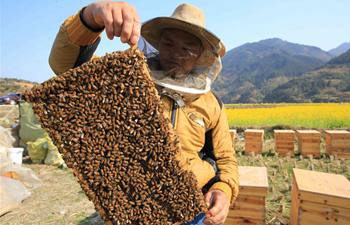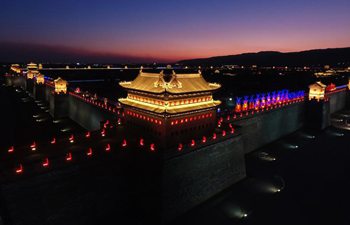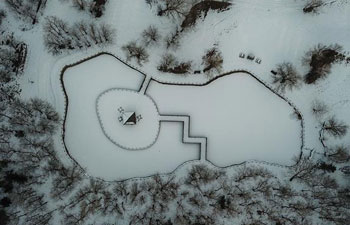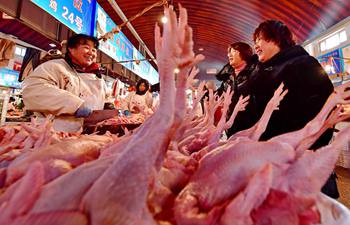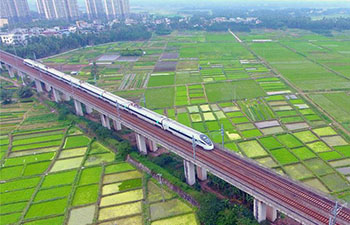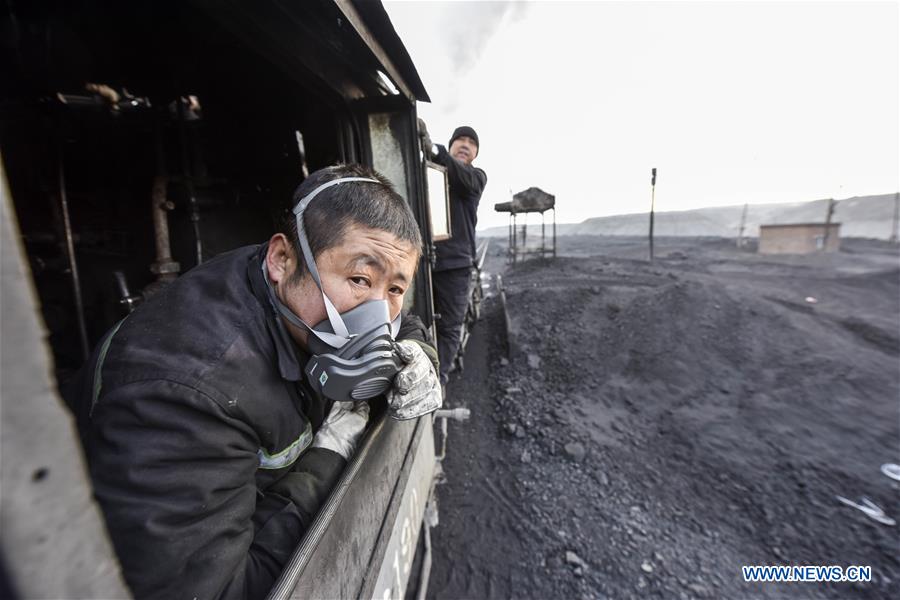
Photo taken on Jan. 19, 2018 shows assistant driver Ma Xinsheng (front) checking the operation of the locomotive at Sandaoling coal mine area in Hami, northwest China's Xinjiang Uygur Autonomous Region. There were altogether 30 plus steam locomotives running in Sandaoling, a key coal mine area in northwest China's Xinjiang, in the late 1990s, but the number has reduced to only 11 nowadays. Responsible for exploiting and carrying coal in the area, the steam locomotives have been outdated due to the development of science and technology, and will be dismantled once break down since no part can be renewed. However, drivers of the machines have devoted nearly their whole life into the work, keeping loving their job and concentrating in accomplishing their mission. (Xinhua/Zhao Ge)
URUMQI, Feb. 5 (Xinhua) -- While it is full steam ahead for the world's longest high-speed rail network, the last steam engine drivers in remote Xinjiang Uygur Autonomous Region are coming to the end of the line.
Carrying coal from the Sandaoling mine, Hami City, the 11 steam locomotives are some of the last running in the country. The coal mine is to shut down within two years, so the train drivers are counting their days.
It is still very dark at 7 a.m. in Sandaoling. The only light comes from a bathhouse, the meeting place for the drivers, 300 meters from the tracks.
It is freezing outside, but inside the house hot dense steam rises, enshrouding the boisterous bathers. To the sound of running water, Liang Guoqiang, the head driver, comes to a blackboard covered with name tags, and begins to arrange the day's schedule.
Drivers with blackened faces are each given a white "off-duty" card and head for the showers, while drivers who just have finished washing get a red "on-duty" card.
"Driving a locomotive in the mine is very dirty work. Your face, everything except your eyes, turns black," says Cheng Zhongyun, 55, driver of the locomotive Jianshe 8190.
Cheng walks to the cabin of his train, deposits food for his 12-hour shift, and begins his work.
Holding a flashlight, he examines the train thoroughly, while assistant driver Ma Xinsheng fills the boiler with water. Stoker Dai Yanjia pokes a mirrored shovel into the furnace to check on the fire. The early-morning silence of the Gobi desert is broken by the puffing of steam.
At least four persons are needed to drive a steam locomotive -- a driver, an assistant driver, a stoker and a flagman. Crowded into the five square meter cabin are the driver, the assistant driver and the stoker, while the flagman leads a lonely existence at the other end of the train.
"To become a driver, you must start as a flagman and work your way up. The flagman has the toughest job," Cheng says. "It's all about meticulousness. There's no room for carelessness in our work. It took me eight years to get this far."
Cheng waits for an hour before the signal light comes on and the train clatters toward the mine.
Without any assistance from computers or smart driving systems, locomotive drivers must stick to one fundamental principle -- keep watching. Cheng and Ma open the windows on both sides, and lean out to look around. They operate the accelerator and the brake entirely by feel. It requires years of practice.
Behind them, Dai keeps shoveling coal into the furnace. Liu Xiaozhi, waves flags, red for "stop" and green for "go."
"I've driven on this route for 23 years. I know every twist and turn, but I must look out every time I make a turn. I can't drive without seeing what's out there," Cheng said.
In winter, the rails freeze immediately the train stops. To get the train and its 364 tonnes of coal moving again on the slippery track, Cheng has to inch forward and back.
At a speed of only 30 kph, it takes an hour for the train to reach the mining zone. Cheng and his colleagues have some time to relax while the coal is loaded.
Cheng checks the boiler and stares blankly out of the window while waiting. Ma puts some steamed buns above the cylinder and in five minutes he can enjoy the reheated breakfast. Dai sands down the calluses on his hands with a grindstone.
"We are retiring this year," Cheng said, "Time flies. We are all in our fifties, and it's time to say goodbye."
"I've spent more time with this iron giant than with my wife," he says, gripping the accelerator. "We are the last locomotive drivers. It's time to go."
Following in his father's footsteps, Cheng started work in 1995, the prime time for the mine.
"At that time the mine went 170 meters deep. It was as busy as a fair. At night it was as bright as in daytime. We made six or seven trips in a shift," Cheng recalled.
"This giant piece of metal is pretty noisy, but isn't very powerful. It's very slow when it is dragging 50 cars," says Deng Yong, who works at Liushuquan station where coal from Sandaoling is transferred to other trains and then across the country.
Opened in 1962, Sandaoling is the largest open-pit coal mine in northwest China. Its annual production reached 3 million tonnes at its peak and at that time more than 30 locomotives were running each day.
As China reduces capacity and fights pollution, coal mines like Sandaoling are shutting down.
By 2020, China will have 30,000 kilometers of high-speed railway in operation, connecting more than 80 percent of its big cities.
Steam locomotives are no longer manufactured in the country and when a train breaks down, there is no way to repair it.
The 60 members of the Sandaoling driving team are all in their fifties. 80 percent of them will retire within three years. The rest will be moved to other positions, according to Liang Guoqiang, the head driver.
Ma is worried that when he retires in May, he won't be able sleep without the clattering.
Cheng has a dream. "I've never taken a plane. I want to fly to Beijing," he said. "And I want to take a high-speed train, too!"




